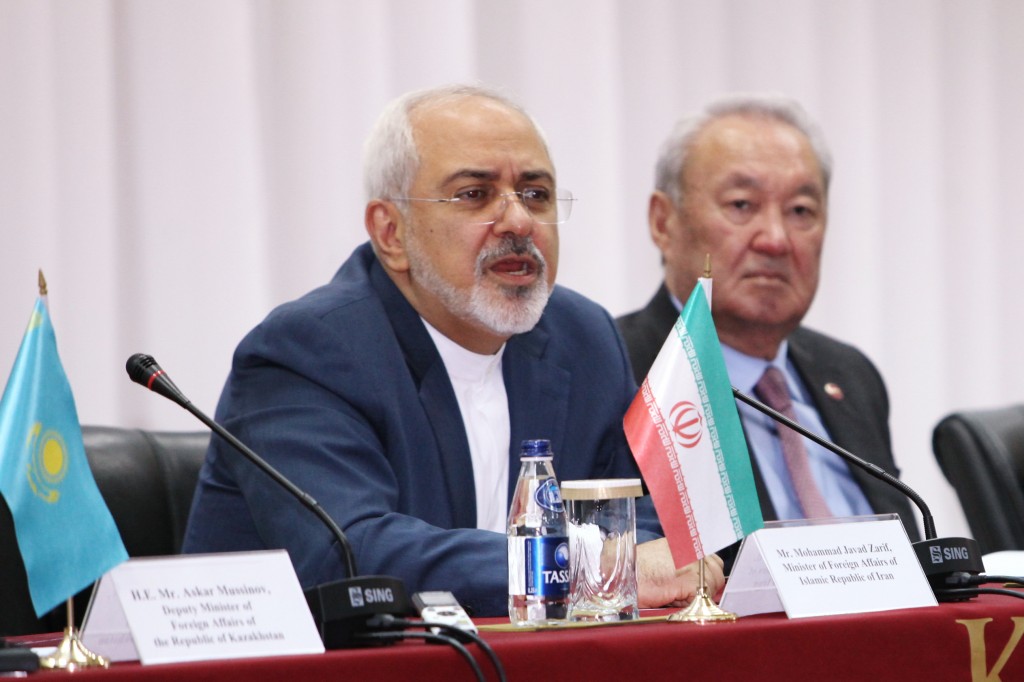ASTANA – On April 13, Iranian Foreign Minister Mohammad Javad Zarif started his official two-day visit to Astana, beginning with a lecture in English at the Kazakh State University of Humanities and Law, where he dwelt extensively on the recent results of the multilateral talks on Iran’s nuclear programme in Lausanne.
In fact, students and representatives of the mass media were able to ask him questions ranging from the Kazakh-Iranian relationship to the recent Lausanne negotiations.
Zarif started his speech with warm gratitude to Kazakhstan for the invitation to visit and their hospitality.
“We share historical ties that go beyond political considerations. We are bound by similarities in culture, traditions, geography and history,” the Iranian foreign minister said.
While talking about the bilateral relationship, Zarif emphasised the importance of Kazakhstan’s role in the region, particularly the importance of the Conference on Interaction and Confidence-Building Measures in Asia (CICA) as one of Kazakh President Nursultan Nazarbayev’s initiatives for enhancing cooperation in the interest of peace, security and stability in Asia.
“For us, Central Asia is our immediate neighbourhood, where we enjoy extremely important and deep-rooted ties of culture, history and religion, in addition to ties of geography. We share many boundaries together: the boundary of the Caspian Sea that we share with Kazakhstan, Turkmenistan, Russia and Azerbaijan. … Our companies, our experts are active in Kazakhstan and the rest of Central Asia, helping in the promotion of industry, railroads, road construction and all other sectors,” Zarif said.
Turning to the most timely issue of the day, Iran’s nuclear programme and the recent talks held between Iran and the P5+1 (the U.S., Russia, China, France, the U.K. and Germany) in Lausanne, Zarif marked the importance of understanding between the consulting countries. “If we want to resolve the nuclear issue, everybody, including the Western countries and particularly the Western countries, must also realise that in today’s world you cannot have security at the expense of the insecurity of others; you cannot impose. No imposed solution is a sustainable solution and I believe that there has been some realisation of that solution in the nuclear discussion, but not in full. Because they are still trying to maintain some pressure. Pressure and cooperation do not go together. You can choose either,” he concluded.
This was the first public speech Zarif has given since the negotiations on Iran’s nuclear programme in Switzerland. It generated some commentary by Central Asia watchers, including from Luca Anceschi, a lecturer in Central Asian Studies at the University of Glasgow, who suggested on Twitter that a nuclear deal between the West and Iran could be a “game-changer for Central Asia,” a land-locked region for which Iran would provide the most direct and the shortest path to the open seas. International sanctions on Iran, caused by concerns over the intent of its nuclear programme, have long been an impediment in the process of unlocking the region’s huge resources, including its abundant oil and gas reserves.
Iran and the P5+1 countries will meet again to sign a final agreement in June. All sanctions on Iran remain in place until the agreement is signed.
The lecture was attended by representatives of the diplomatic corps and the media, students of law departments of the university and Deputy Foreign Minister of Kazakhstan Askar Mussinov, who was there to welcome the Iranian foreign minister.
During his visit to Astana, Zarif also met with President Nazarbayev, Chairman of the Senate of the Parliament Kassym-Jomart Tokayev and Kazakh Foreign Minister Erlan Idrissov. Key regional and international developments are on the agenda of these meetings.
President Hassan Rouhani paid an official visit to Kazakhstan last September where he also participated in the Iran-Kazakhstan economic forum.

